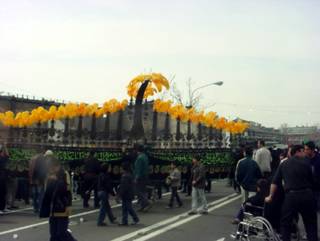
Mourning Hussein

Repost from last year.
Who Is My Street?
Ashura is an attempt to commemorate what to the Shi’ias is the epic Battle of Karbala. It is best to think of it as a Manifesto which articulates a worldview, just as much tragic as it is redemptive.
I have been roaming around for two days trying to experience this event as the participants do. No different from reading a book, really. You simply have to read closely enough to let the book speak to you--if only to get a sense for what you are up against. This was the first for me Call it a much needed cultural revolution on my part.
We Iranians, as a general rule, tend to see what we need to; always ready to dismiss what offends us simply as silly or as yet another example of the myriad superstitions of the unwashed. There are all kinds of rituals in this world. Some survive, some don’t. There are all types of religions in the world. Some thrive, some don’t.
What is it about these events which so compel such a large number of Iranians to participate year after year? What is it about Shiism that makes it so potent?An amazing experience—in an odd sort of way.
Activities are multifaceted. There is an intense feel of community--something distinctly missing in Tehran these days. There were street theaters known as Taziyeh or passion plays. Groups of Men, young and old were beating their chests rhythmically and self-flagellating with chains. Others were beating drums, and lamenting loudly.
They have been at it for a couple of weeks, I presume, trying to prepare for the activities. There were genuine weeping and tears. In a different time, we would have called this catharsis.
No self mutilations with machetes this time around. I am sure you have seen pictures of this particularly gruesome spectacle. But this manner of mourning is now illegal in Iran. Those wishing to bleed are encouraged to visit one of the many Mobile Blood Donor Centers set up by the Government all around town for the duration of the rituals. There was a fatwa in order to encourage the believers to comply.
The ones I visited were quite full.Mothers, wives, and sisters were walking around their men, watching them and occasionally participating in by quietly beating their own chests. Children were dressed for the occasion and participating playfully. Quite a number of houses were busy preparing food for large number of people-- giving them to the neighbors or anyone who decided to queue up to receive a meal.
Amazingly, the poor neighborhoods were more generous in giving than the more affluent. Everything is distributed free of charge and their consumption is generally considered a blessing. (Barakat) Some houses had a picture of lost loved ones--who were most often killed during the War.
They were mourning their own dead just as much as the decapitated Imam. The events also provided a venue for socializing. The neighbors who hardly see each other these days take the time to mingle and catch up. I also caught quite a few men and women respectfully flirting and possibly searching for potential friends or mates. An amazing sight since subtlety is a lost art in Iran. There is normally much posturing or simple crassness. It was nice to see sweetness, discernment, and discrimination. My relatives validated my impression arguing that this particular aspect of the ritual has become all the more pronounced in recent years.
I walked uptown stopping to look at a poster close to my home this evening. There were pictures and names. All dead in the war--“neighborhood martyrs” in the vernacular. I looked very closely –pictures, names and pictures. They all appeared so young and innocent.
I now have a vivid and painful picture for all the streets, and the intersections I roam around everyday. Each one of my streets is named after one of my neighborhood fallen--the casualties of the longest trench war-fare of the Twentieth Century.
I probably have been running into some of their relatives everyday--often being irritated by their brusque, uncivil manner. And I now wonder: have they ever healed? Do any of us, really ever?
My streets feel different tonight.

No comments:
Post a Comment